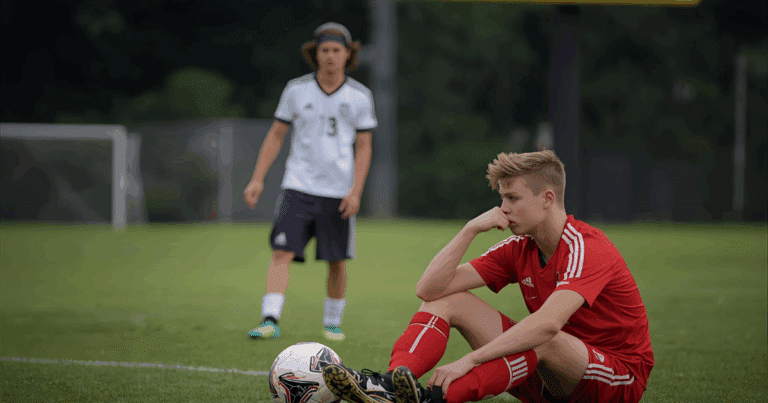How to Be a Positive Parent to a Soccer Player

Before we begin, I admit that I’m not a perfect Dad. None of us are perfect parents so don’t let it get in the way of parenting a young athlete. You and I do the best we can. New things happen and we approach it the best way we can. This is okay!

Now that we got that out of the way, I do think each of us can have a positive influence on our young athletes if we are aware of it. Being a positive parent can be the antidote young America needs right now.
In this article, I’ll lay out some tips and advice from my experience in parenting and coaching. Take it all with a grain of salt because I don’t know your situation but this is what has worked for me!
Key Takeaways
- Foster a supportive environment by encouraging fun, teamwork, and good sportsmanship.
- Develop positive communication with your child, their coach, and other parents. Never talk bad about anyone, especially other players.
- Be a role model and act accordingly by celebrating effort and progress, listening, and providing constructive feedback.
- Don’t take it too seriously. You don’t want to look back 10 years from now and wonder “What if…”
Build a Positive Environment
As a soccer parent, you play an important role in creating a positive and supportive environment for your child. Here are three ways you can foster such an environment:
Remind Them It’s Team First

Encourage your child to be a team player and to support their teammates. Remind them that soccer is a team sport and that everyone needs to work together to achieve success.
You can also show support for the entire team by watching games and cheering for all the players, not just your child.
When you remind your child that it takes a team to compete, you’ll take away the pressure to succeed as an individual player.
Promote a Healthy Lifestyle
Promoting a healthy lifestyle is crucial for your child’s success on and off the field. Make sure your child eats a balanced diet and drinks plenty of water.
Encourage them to get enough sleep and to stay active outside of soccer practice and games.
Not only will this help your child physically but they will gain more mental clarity. This is super important as they enter into the teenage years.
You can also lead by example by living a healthy lifestyle yourself.
Respect the Coach’s Decisions
Respecting the coach’s decisions is important for creating a positive and supportive environment. Trust that the coach has your child’s best interests in mind and support their decisions, even if you don’t always agree with them.
The coach may see something you don’t. They may be challenging the players in their unique way. It’s hard to understand if you aren’t in it. In most cases, players don’t care or realize that their coach may be difficult. It’s harder on us as parents.
Avoid criticizing the coach in front of your child or other parents, as this can create a negative atmosphere and undermine the coach’s authority. This can also lead to a long season.
Be There For Your Child

Like most things in life, showing up is 90% of the battle. As a soccer parent, it’s important to communicate effectively with your child to help them succeed on and off the field.
Developing positive communication skills can help your child feel supported and motivated to do their best. Here are some tips for developing positive communication:
Active Listening Skills
Active listening skills involve paying attention to what your child is saying and responding in a way that shows you understand and care.
This means giving your child your full attention when they’re talking to you, avoiding distractions like your phone or the TV. You can also use body language to show you’re listening, such as nodding or making eye contact.
Let them talk first without any interruption. Be a sounding board before you provide advice. In my opinion, the best response is simply agreeing with them and finding compassion.
Constructive Feedback
Giving constructive feedback can help your child improve their soccer skills and grow as a player and person.
When giving feedback, focus on specific actions and behaviors, rather than making generalizations or criticisms. For example, instead of saying “You’re not playing well,” you could say “I think your work ethic drops a little after half-time. Let’s figure out what you can eat quickly to regain that energy you have in the first half.”
Handling Wins and Losses
Prioritizing development over W’s and L’s is paramount. Focusing on progress is better than the result. In the grand scheme of things, wins and losses won’t matter. How you get better will.
But, I get it. Soccer games can be emotional, especially when your child’s team wins or loses. It’s important to handle both situations with grace and positivity.
If your child’s team wins, celebrate their success and acknowledge their hard work. If they lose, offer words of encouragement and support, and remind them that losing is a natural part of the game.
Act Accordingly
As a soccer parent, you play an important role in shaping your child’s experience on the field. Our kids are always watching what we do, so it’s important to act accordingly. Here are some tips to help you be a positive parent to your soccer player:
- Stay calm and positive: Keep your emotions in check and stay positive, even when things don’t go as planned. Remember, your child looks up to you and takes cues from your behavior. If you get upset or frustrated, it can make them feel anxious or discouraged. Think about what you can control and handle it.
- Respect the coach: Let the coach do their job and avoid interfering with their decisions. If you have concerns or questions, approach them calmly and respectfully. Don’t criticize or undermine them in front of your child or other parents.
- Encourage good sportsmanship: Teach your child to be a good sport and respect their opponents, referees, and teammates.
- Avoid sideline coaching: Resist the urge to coach your child from the sidelines. Let the coach do their job and focus on supporting your child from the stands. Shouting instructions or criticism can be distracting and stressful for your child.
- Be supportive: Show your child that you’re proud of them, win or lose. Celebrate their successes and help them learn from their mistakes. Encourage them to have fun and enjoy the game, regardless of the outcome.
- Show up: One of the best things you can do as a parent is to show up. Show up to their games no matter how far it is. Prioritize their season over work or any other commitments (if you can).
Remember, being a positive parent is about setting a good example and supporting your child’s development on and off the field. By acting accordingly, you can help your child thrive and enjoy their soccer experience for years to come!

Written By: SoccerNovo
SoccerNovo is an independent youth soccer media brand built to help parents, players, and coaches better understand the game and the pathways available in U.S. soccer. Our mission is to make youth soccer simpler, clearer, and more accessible for everyone involved in it.
Let’s connect






